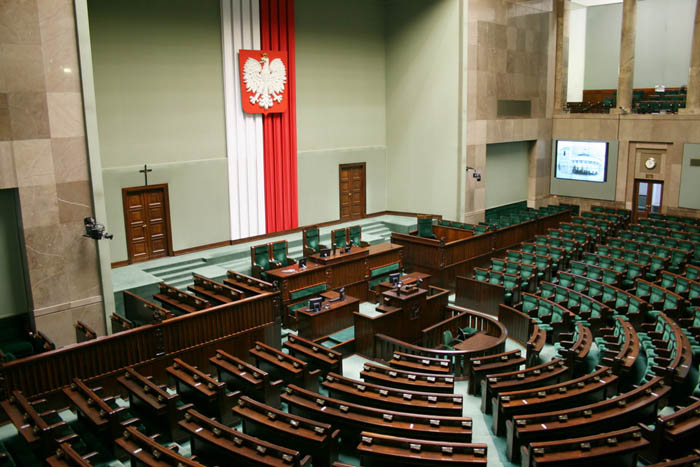[vc_row][vc_column][vc_column_text]

The Sejm of the Republic of Poland, the lower house of the Polish parliament.
Poland’s ruling Law and Justice Party (PiS) has had a lot to celebrate in recent months. Just three days after the country’s 98th Independence Day, PiS celebrated one year in office on 14 November. The party, which has a majority in the Sejm, has had a largely free hand in making the “good changes” it had promised in its infamous electoral slogan.
These changes have included making the Polish constitutional court “submissive”, dismissing hundreds of journalists from the newly patriotic national – but no longer public – media, introducing limitations to the right to assembly and extending the state’s power of surveillance.
Last January, the surveillance act added powers to the country’s foreign secret services and the police by allowing them to tap into a wide range of telecommunications details completely unchecked. Ironically, the reform was first prompted by the constitutional tribunal, which, in 2014, had ruled the then-surveillance laws to be unconstitutional. With particular relevance to journalists and media workers, it recommended that those with a right to professional confidentiality could only be under surveillance after court approval.
Far from incorporating these and other recommendations of Poland’s highest court into the surveillance reform, PiS allowed for all broadband lines to be tapped into directly without judicial oversight or the possibility for internet service providers to request more details as to the reasons for such activities.
Wojciech Klicki from the Polish anti-surveillance foundation Fundacja Panoptykon which is run by lawyer activists, told Mapping Media Freedom that the “most important issue has always been the lack of an institution that would check whether intelligence services are acting in accordance with the law” and that was only made worse through the surveillance act.
The anti-terrorism act which came into effect in late June enables unchecked surveillance of foreign nationals once the ABW — Poland’s internal security agency — establishes their possible ties to terrorism. It also allows for websites to be blocked for five days without prior judicial consent and up to 30 days thereafter, should they be deemed to disseminate terrorist content.
Klicki said: “This has enormous implications for media freedom. Fundamentally, the laws do not offer a precise delineation as to what constitutes a ‘connection to an event of terrorist character’. Such a connection may be an article reporting on an event. And the definition is very broad, not only including obvious events like a bomb attack but other common crimes, which were committed with the aim to direct public authorities towards a certain decision, for example through bribery.”
Klicki noted that a five-day ban of a website can mean its demise in times of fast data, as such an incident is likely to result in a withdrawal of advertisers.
As part of its campaign against the law, Fundacja Panoptykon set up a petition and took part in a public consultation specifically for NGOs and activists with the governmental human rights representative Adam Bodnar. Indeed, Polish authorities are hard-pressed to justify the severity of the law due to the country’s very low terrorist threat – in April, the British Foreign Office, stressed the danger of driving a car in Poland while emphasising the terrorist threat there was negligible compared to the European average. Aside from a “tiny tweak of the definition for the ‘event of terrorist character’” as Klicki noted, the law was enacted within two months of its announcement in late April, and ratified by the president, Andrzej Duda, on 22 June.
Of course, journalists can’t be immune from surveillance by their own country or foreign secret services and Polish journalists have had their fair share of encounters with their domestic Anti-Corruption Bureau (CBA). The Gazeta Wyborcza journalist Bogdan Wróblewski won a case against the Bureau in 2013 which consequently had to apologise to him for tapping his telecommunication billings. The CBA’s reason for its ambitious investigation, it emerged during the trial, was to uncover Wróblewski’s and several other regime-critical journalists’ sources. The events took place under the former PiS government term.
Klicki assesses that the recent anti-terrorism laws only exacerbate the problem, especially for foreign journalists. Due to the changes, “journalists can have huge trouble to manage to adhere to their professional confidentiality in Poland”. Asked how Polish journalists make sure they are able to protect their sources, Klicki says they were “now becoming aware of how necessary it is to increase their know-how in the realm of secure communication”, by attending workshops on anonymity, which are offered by his foundation. There is also more information on secure communication online specifically for fixers.
The human rights representative Bodnar submitted the anti-terrorism law to the constitutional tribunal. However, the tribunal has effectively lost its status as an institution of checks and balances though the numerous legislative changes over the past year. Former judge of the tribunal, Andrzej Zoll, commented: “This is the end of a democratic rule of law.”
Mapping Media Freedom
Click on the bubbles to view reports or double-click to zoom in on specific regions. The full site can be accessed at https://mappingmediafreedom.org/
[/vc_column_text][/vc_column][/vc_row][vc_row][vc_column][vc_basic_grid post_type=”post” max_items=”4″ element_width=”6″ grid_id=”vc_gid:1481910799662-a9a879ef-f11e-7″ taxonomies=”6632″][/vc_column][/vc_row]




